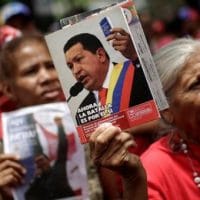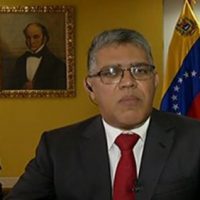-
The Venezuelan dilemma
I know a number of people in Venezuela and academia in the U.S. and elsewhere who I used to see eye to eye on with regard to Chavez and I now find them expressing total rejection of and even animosity toward the government. The only thing that binds us now is our common support for the need to defend Venezuelan sovereignty, and sometimes not even that.
-
Time for the “International Left” to take a stand on Venezuela
The possibility of an open civil war in Venezuela is not shocking. People are tensing up with the International left being reluctant to show solidarity with the Maduro government and the Bolivarian socialist movement. The need to examine what “neutrality” or, allowing the opposition to come to power via an illegal and violent transition, would mean.
-
Empire Files: Abby Martin in Venezuela: supermarkets to black markets
Abby Martin talks to Venezuelans on the streets of Caracas and investigates the main claim that there’s no free press, and that there is no food in the supermarkets. Using hidden cameras, she takes you through local grocery stores and the underground black market currency exchange, the main source of inflation in the country. Abby sits down with economist Pasqualina Curzio to learn more about the nature of the black market and chronic shortages of goods. Knowing that world leaders are calling for foreign intervention, Abby finds out if locals agree.
-
Empire Files: Abby Martin meets the Venezuelan opposition
Abby Martin goes on the deadly front lines of the anti government protests in Venezuela and follows the evolution of a typical guarimba—or opposition barricade. She explains what the targets from the opposition reveal about the nature of the movement and breaks down the reality of the death toll that has rocked the nation since the unrest began, and how a lynch mob campaign came after her and the Empire Files team for reporting these facts.
-
Venezuela: ‘our revolutionary democratic experience is at stake’
Revolutionary activist and sociologist Reinaldo Iturriza has spent many years working with popular movements in Venezuela and writing on the rise of Chavismo as a political movement of the poor. He also served as Minister for the Communes and Social Movements, and then Minister for Culture in President Nicolas Maduro’s cabinet between 2013 and 2016.
-
What do Venezuelans think?
Venezuelan public opinion is not what you’d expect if you rely on the disinformation loop in which corporate media and Washington-friendly NGOs like HRW participate.
-
Venezuela responds to Pence
Responding to the United States vice president’s recent statements that “democracy is undermined” in Venezuela, Venezuelan President Nicolas Maduro and Foreign Minister Delcy Rodriguez strongly rejected Pence’s claims.
The Bolivarian leaders denounced the plan to destabilize Venezuela as “imperialist,” saying that the “extremism” and “militarism” of the U.S is a “serious threat to humanity.”
-
The political defeat of the Venezuelan right-wing
Foreign support to the Venezuelan right in the form of money, weapons, and propaganda is ongoing. Some oil corporations, such as Exxon Mobil, are directly involved in destabilization policies.
-
The need to radicalize the Bolivarian Revolution
The Bolivarian Revolution in Venezuela is facing its most challenging times. The right-wing opposition, backed by the United States, is engaged in a full-blown “regime change” campaign, with violent protests occurring daily for over 2 months and resulting in over 50 casualties. The chavista supporters of the government have also taken to the streets in […]
-
Venezuela is deep into civil war
Following the script by the experts and strategists of the CIA, specialized in destabilizing and tearing down governments, counter-revolutionary tactics in Venezuela have made a “quality jump”: what began with a warm-up on the streets has now transitioned to a non-declared (but nonetheless bloody) civil war.
-
Standoff in Venezuela
Venezuela has been rocked in recent weeks by almost daily protests and counter-protests, as right-wing opponents of socialist President Nicolas Maduro seek to bring down his government.
-
Venezuela Government Accuses U.S. of Bankrolling Right-Wing Violence
The U.S. media’s treatment of the crisis in Venezuela is almost as craven as the corporate media in Venezuela itself. Articles like the following from TeleSur, and an article we recently posted from The Dawn, provide a much-needed corrective. As Marta Harnecker explained the April 2017 issue of MR (“A New Revolutionary Subject“): “The attacks […]
-
“To preserve peace in Venezuela, there’s no choice but to convene nationwide dialogue to reform the Constitution”
From El Salvador, where the meeting of Chancellors of the Community of Latin American and Caribbean States (CELAC) is being held, the Minister of Education and leader of the Presidential Commission of the Constituent National Assembly affirmed that one of his goals is to restore the principle of cooperation of the powers, because that’s the only way to preserve peace in the country given the opposition’s lack of will to dialogue.
-
Reading Marx’s Capital Today: Lessons from Latin America
One hundred and fifty years ago, Karl Marx published his book Capital, an intellectual effort of great breadth, with the aim of revealing the logic of capitalist production and providing workers with theoretical instruments for their liberation. Having discovered the logic of the system, he was able to foresee with great anticipation much of what is happening in the world capitalist economy today. But, we cannot mechanically apply what is outlined in Capital to the current reality of Latin America.
-
The Election of Donald Trump
1. The recent election of Donald Trump after Brexit, the rise of fascist votes in Europe, but also and much better, the electoral victory of SYRIZA and the rise of Podemos are all manifestations of the depth of the crisis of the system of globalized neoliberalism. This system, which I have always considered unsustainable, is imploding before our eyes at its very heart. All attempts to save the system — to avoid the worst — by minor adjustments are doomed to failure.
-
Interview with Steve Ellner: Is the Bolivarian Revolution a Populist Failure?
In part II of our interview with Steve Ellner, the Universidad de Oriente professor discusses a range of contentious issues in Venezuela, including the efficacy of state social programs such as the CLAPs, rentierism, and the Maduro government’s controversial Mining Arc, as well as the role of international solidarity. Part I of the conversation can […]
-
Interview with Steve Ellner: Democratization of PSUV Is Key to Chavismo’s Future
Distinguished Venezuelan history and politics professor Steve Ellner visited Caracas from September 26 to October 7 to teach an intensive seminar at the Venezuelan Planning School, titled “The Role of the Venezuelan State in the Transition to Socialism.” Venezuelanalysis‘s Lucas Koerner sat down with the long-time Universidad de Oriente professor to discuss a range of […]
-
Strike at the Helm? Clamors from a Makeshift Raft
In a cabinet meeting in October 2012, months before his death, Hugo Chávez declared that the Bolivarian process needed to make a radical change of course, literally calling for a “golpe de timón” or “strike at the helm.” From that moment forward the slogan “golpe de timón” began to circulate in the most varied contexts […]
-
The Challenge Before the Latin American Left
The Left upsurge in Latin America appears to be abating. In October 2015 Jimmy Morales, the conservative candidate in Guatemala, defeated the Left-leaning Sandra Torres in the presidential elections. On November 22, Mauricio Macri, the conservative presidential candidate in Argentina, defeated Daniel Scioli, his Peronist rival, by a narrow margin, to bring to an […]
-
A New Political Situation in Latin America: What Lies Ahead?
“Venezuela defines the future of the progressive cycle” In your work on South America, you speak of the duality that has characterized the last decade. What exactly is that duality? Claudio Katz: In my opinion, the so-called progressive cycle of the last decade in South America has been a process resulting from partially successful […]















